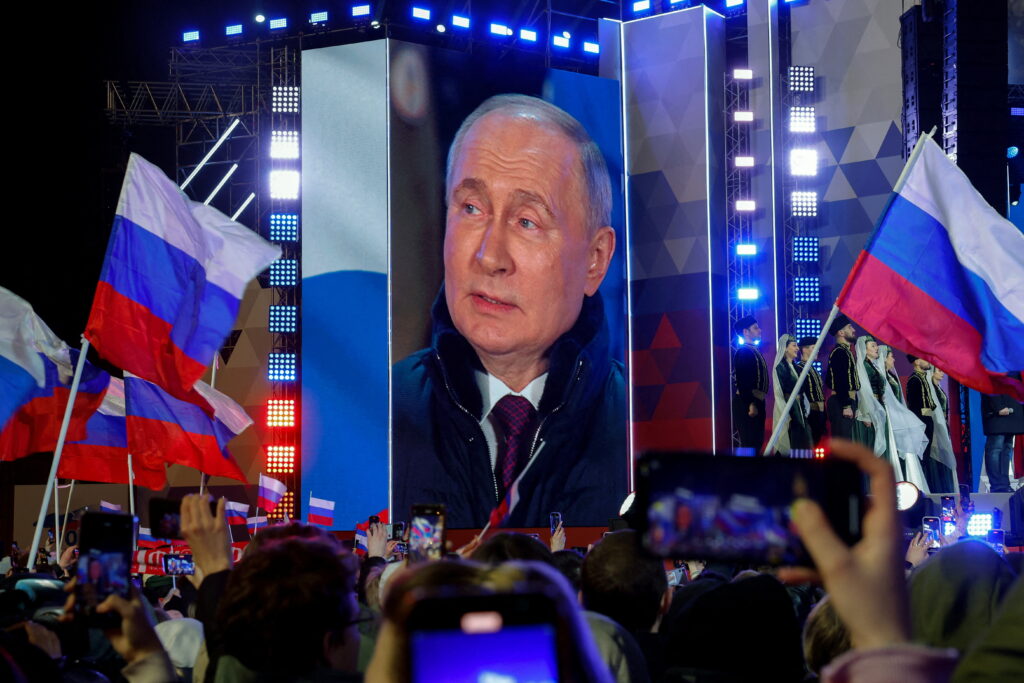Alongside the direct military consequences, Russia’s 2022 invasion of Ukraine also accelerated changes in domestic administration. The Kremlin ramped up its crackdown on dissent, harshly applying both pre-existing and new laws. In regional politics, the vertical of power was strengthened along lines spelled out in recent years. In two cities where opposition movements and parties had made inroads in recent years — Novosibirsk and Tomsk — the regional legislature scrapped direct mayoral elections, leaving only five regional capitals with direct mayoral votes (for the time being). Several cities and regions saw their electoral system changed to increase the number of seats obtained via majority voting, which benefits United Russia. «Remote electronic voting», or online voting, which in the past made it easier for the federal authorities to engineer turnout and increase the support of the ruling party, was scheduled to be extended to twenty-five regions in the 2023 regional elections. While the Duma did not adopt the second part of a centralizing public administration reform that would have scrapped the administrative independence of eighteen thousand urban and rural settlements along with their representative institutions, some regions (e.g. Pskov) have started restructuring their administrative systems along the lines laid out by the bill.
There has also been a fresh initiative presented in the Presidential Council on Local Self-Governance. The plan is to task «Senezh,» a center of political management under the Kremlin’s domestic policy administration, to essentially extend a system of so-called «Centers of Regional Management» (TsUR). This system collects complaints and taps the mood in the regions as a way of preventing issues from festering into political problems. One purpose of this is to replace soon-to-be-scrapped institutions of representative government. However, from the point of view of the Kremlin and its representatives in the regions, it is likely just as important that TsURs bypass local power brokers and interest groups who are typically represented in city and municipal councils.
Local power-sharing deals with systemic opposition parties were also scrapped: in the Smolensk Region, Alexey Ostrovsky, one of the former heavyweights of the Liberal Democratic Party (LDPR), was replaced by Vasily Anokhin, a career civil servant from deputy Prime Minister Marat Khusnullin’s team; in Omsk Alexander Burkov, a notable local politician of the Fair Russia party, had to cede his seat to Vitaly Khotsenko, an official with links to the energy industry who briefly administered the Russia-appointed government of the occupied Donetsk Region, with no clear compensation for either party; in Novosibirsk the scrapping of the direct mayoral vote upset a power-sharing deal between local communists and the region’s governor, Andrey Travnikov.
Tighter purse strings
In short, it appears the Kremlin was keen on minimizing political risk factors in the regions, by seeking more centralization. However, this time centralization is taking place against the backdrop of worsening economic outlooks, an increasing burden on regional budgets that badly need to ramp up spending on fixing and building infrastructure. Indeed, infrastructure-related expenses grew by 65.5 percent year-on-year in the first quarter of 2023.
In one of the latest chapters of these changes in May the Duma had to adopt a correction to the system of single tax accounts, which started functioning in January. These effectively prioritized the needs of the federal budget by pooling tax receipts and caused significant disruptions for regional treasuries, for which personal income tax receipts constitute around a third of incomes on average (with large differences between regions). Several regions were openly complaining about this. However, it now also appears that, even with the correction, personal income tax receipts are falling short of expectations, possibly due to the combined effects of military mobilization, falling profit margins and companies moving into the grey economy.
The solution of the federal center has been to provide more treasury loans and interbudgetary transfers, both of which comes with strings attached. Yet this approach has not strengthened the incomes of the regions. The government’s «windfall tax» on companies will, for instance, go entirely to the federal treasury, which has also faced shortfalls, as recent discussions on the margins of the St. Petersburg International Economic Forum about whether to raise taxes or cut spending showed.
Meanwhile, even if it is unlikely the federal budget will run out of money to prop up regional finances when needs arise, the needs of the war and the occupied territories are clearly prioritized. In 2023 the four regions occupied last year are scheduled to receive 410 billion rubles just in direct budgetary grants, making them as reliant on federal money as regions like the much smaller Chechnya or Ingushetia. Apart from this being an incredibly high-risk investment, it also reduces the amount of money available for Russian regions. It is half of what is available for the regions of Russia and the occupied Crimea. Beyond this, more than half of Russia’s regions will allocate money from their own budgets on purposes of «reconstruction». The Krasnoyarsk Territory, for instance, recently budgeted 5.7 billion rubles over three years on construction projects in a district near Luhansk.
War-related expenses, from mobilization and reconstruction to keeping local economies afloat and writing off unrealized incomes, put a strain not only on regional budgets but also on the budgets of municipalities that depend on transfers from regions to an even larger extent than regions do on federal transfers. Over the past years, the core element of the authorities’ strategy, has been managing the expectations of citizens towards services provided by municipalities (e.g. waste removal, beautification, sanitation works). Following the 2022 invasion, some local officials have used the war as an excuse to explain why existing projects were not carried out. Anton Alikhanov, the governor of the Kaliningrad Region, has recently justified canceling the renovation of kindergartens by saying that the region had to send this money to relief efforts near the blown-up Kakhovka Dam. In June, regions have started economizing on various budgetary items from construction projects to payments to mobilized men.
But this is increasingly risky in a situation where local issues are often the last remaining territory of open conflict between citizens and the government. In June Putin ordered the government to come up with solutions to increase the budgetary stability of municipalities, which met the approval of some (including former Yakutsk mayor Sardana Avksentieva, one of Russia’s most recognizable municipal politicians), but it is difficult to see how this is going to happen in practice without devolving budgetary authority.
Pushbacks
Some governors have used the war to demand more fiscal or political authority. Belgorod governor Vyacheslav Gladkov has used the pretext of restoring shelled buildings to demand more funds from the federal government several times over the past months even though the region’s budget likely suffered more damage due to the breakdown of the local metallurgical industry. Gladkov (and other officials in border regions) seek more money and wider operational powers to deal with the direct consequences of the war for their residents, since the federal government has seemed uninterested in seriously addressing these incidents (it took more than two weeks for Sergey Kirienko, the deputy head of the Presidential Administration, to visit the Belgorod Region following the incursion of pro-Ukraine Russian paramilitary groups and repeated shelling attacks, as the first federal official).
On June 2 the speaker of the legislature of the Tomsk Region, Oksana Kozlovskaya, complained to members of the Federation Council that the federal government takes too much — 75 percent — of the region’s tax intake, leaving the regional government 20 billion rubles short of implementing social projects at an adequate level. This is not the first time the region’s officials were demanding the federal government to leave more money in Tomsk; but the timing is curious. Just days after Kozlovskaya’s statement the Tomsk city council adopted a resolution calling for the return of direct mayoral elections. The initiators of the resolution cited a failure of the city to select a new city manager (in April both candidates allowed by the authorities ended up withdrawing), but Tomsk citizens had been repeatedly (and unsuccessfully) trying to stage protests against the scrapping of elections over the past months.
A remarkably similar chain of events took place in Novosibirsk, where on June 5 the regional electoral committee accepted an initiative to hold a referendum on bringing back direct mayoral elections, even though it had rejected the same initiative twice on various procedural grounds. This does not mean that a referendum will be held in the city, but it does mean that the regional parliament will have to discuss the matter. The decision was made shortly after governor Travnikov had suggested local company managers to fork out more money for the purposes of the «special military operation» voluntarily. The regional budget officially spent 4.2 billion rubles from its own funds on this in 2022. A similar initiative was accepted by the electoral authorities of the Komi Republic and supported by local communists (though later rejected by the regional parliament).
These conflicts are not a bug, but a consequence of the way governance in Russia was designed to work in crises. While Putin’s decrees signed in October 2022 theoretically enabled governors to take their regions’ economies under tighter control in order to ensure that the needs of the army are met, in reality governors shared these powers with the local representatives of the security elite and in most cases — again, similarly to COVID-era lockdowns — ended up looking for cues from the federal government on what measures to adopt (e.g. drone bans adopted by fifty-six regions). Governors are thus tipped to manage politically sensitive and risky issues, but they will pass the bucket down, putting pressure on local businesses and public institutions if they need to. This is what happened during Russia’s 2021 vaccination campaign when several regional governments enlisted the help of private organizations to improve their vaccination statistics, and this seems to be happening once again with regions pressuring public and private organizations to share the administrative and financial burdens of mobilization or reconstruction.
One way for local elites to fight back is co-opting grassroots causes, such as the issue of direct mayoral elections, rising public utility tariffs or substandard waste collection. Some regions with more pluralistic politics, e.g. Novosibirsk and Khakassia, also saw heated discussions over the introduction of online voting, leading to seven regions opting out from the experiment this year. This kind of tactics, of course, can be risky and is not always successful. Due to the high importance attached to the issue of the war in the federal government, anything that makes a regional government look bad in this field will likely not be tolerated. When in early 2023 Izhevsk residents mounted a protest against plans to turn a mall into a drone factory, the city’s mayor was promptly dismissed. Apart from this, however, the lines are blurry. As Kremlin-appointed governors need to navigate the often-conflicting priorities of keeping local elites in check, increasing the trust in regional institutions and following the Kremlin’s war agenda, chances are that we are going to see more conflicts of the sort described above.
These of course remain a far cry from the conflicts of the 1990s that took place between a fiscally and politically significantly more autonomous regional elites and a weaker federal government. The nature of financial relations between the federal center and the provinces is clear. These emerging open disagreements, however, show that money is increasingly tight and regional governments will have to devise new ways to get it — from the federal budget or from elsewhere. They also show the importance of local grassroots initiatives and independent deputies who were elected to city councils and regional legislatures over the past years, who have been able able to keep certain issues on the agenda.










